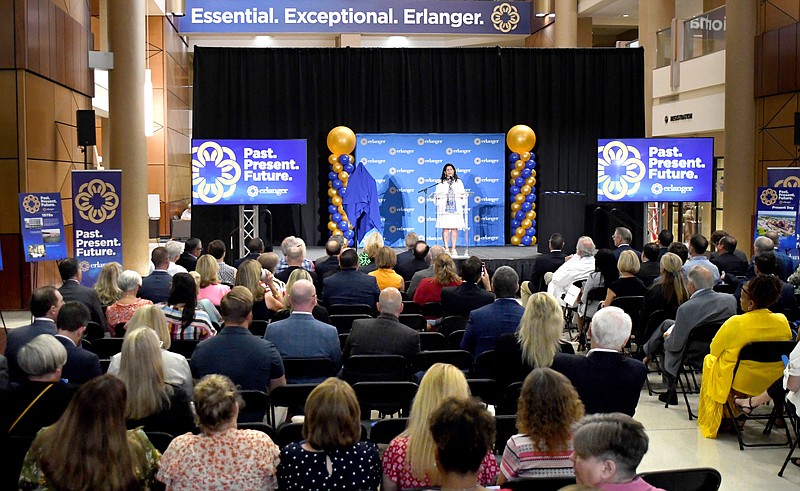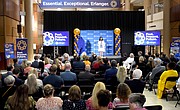With the transition to a nonprofit model for Erlanger Health complete, hospital leaders are looking to capitalize on the competitive edge that comes with no longer being a government entity.
Erlanger's plan to restructure its governance got the green light from local and state lawmakers last summer. Since then, the health system's board, attorneys and staff had the undertaking of transitioning the Chattanooga region's largest hospital from a public to a private entity, including reworking Erlanger's financial systems, contracts and employee benefits.
"All that work in the background, plus running a hospital at the same time, has sort of faded away, so now we can focus on operations and get back to business," Erlanger CEO Jim Coleman told attendees at a celebration event Thursday.
Erlanger provides essential and costly specialty services — such as the highest level of trauma, stroke and pediatric care — not offered by other hospitals in the region and serves as a training hub for future clinicians.
At the same time, Erlanger is the region's only safety net hospital and treats more uninsured patients and those on Medicaid — which pays significantly less than commercial insurance — than its competitors.
Speaking at Thursday's event, Hamilton County Mayor Weston Wamp said Erlanger is "probably the single institution in which you can best understand our community, our strengths, our people, our challenges" as he gave a nod to clinicians.
"There's a grittiness, and I would argue a swagger, to those who have committed themselves to this hospital that serves all comers — people who are insured to the highest level and people who come in pleading for help — and it's an extraordinary part of our community's legacy," Wamp said.
Erlanger was built in 1891, making it Chattanooga's first hospital. Over the years, Erlanger grew to become one of the nation's largest public hospital systems, with six hospitals across Southeast Tennessee, including the only children's hospital within 100 miles; a hospital in Murphy, North Carolina; and an academic teaching program affiliated with the University of Tennessee College of Medicine.
Preserving the hospital's mission and protecting its 6,700-plus employees were paramount concerns for those who worked to bring the new Erlanger Health to fruition.
Though the hospital is operating in the black, sustained financial success has historically eluded Erlanger, making it difficult to recruit staff and invest in capital needs. Erlanger has received significantly less funding from the state and local government compared to other public hospitals in the United States.
Dr. Chris Poole, chief of Erlanger's medical staff, spoke Thursday on behalf of the health system's 825 physicians and 458 advanced practitioners, thanking the Erlanger board members, leaders and attorneys who played a role in the transition.
"Erlanger has been known to take care of some of the sickest patients in our area for over a century and has often done so under conditions of austerity," Poole said, adding that he's hopeful the new structure will provide Erlanger opportunities to open and staff more of its beds and free up space in the emergency department.
Aside from no longer being subject to laws requiring government business to be conducted in public, some competitive advantages of Erlanger's new model include being able to pursue more joint ventures, negotiate better contracts and onboard new physicians more quickly.
Poole, a nephrologist, cited kidney transplants as one of the specialty services that in Chattanooga only occurs at Erlanger.
"Patients may come from greater than 2 hours away to undertake this life-changing surgery," he said. "We want to continue to assure that if these patients have issues with their transplant at any point, we have ample capacity to promptly get them back to Erlanger for care that can best be provided here."
Other speakers at Thursday's event included Chattanooga Mayor Tim Kelly, state Sen. Bo Watson and Erlanger Board Chair Sheila Boyington, who credited the many people and groups who made the transition possible. Those include the current mayors, former Hamilton County Mayor Jim Coppinger, the Hamilton County legislative delegation and current and former county commissioners.
Boyington also thanked the current and past trustees, including Coleman, who was previously board chair, and Board Secretary Vicky Gregg. Coleman and Gregg were the trustees who initially spearheaded Erlanger's transition.
Contact Elizabeth Fite at efite@timesfreepress.com or 423-757-6673.

